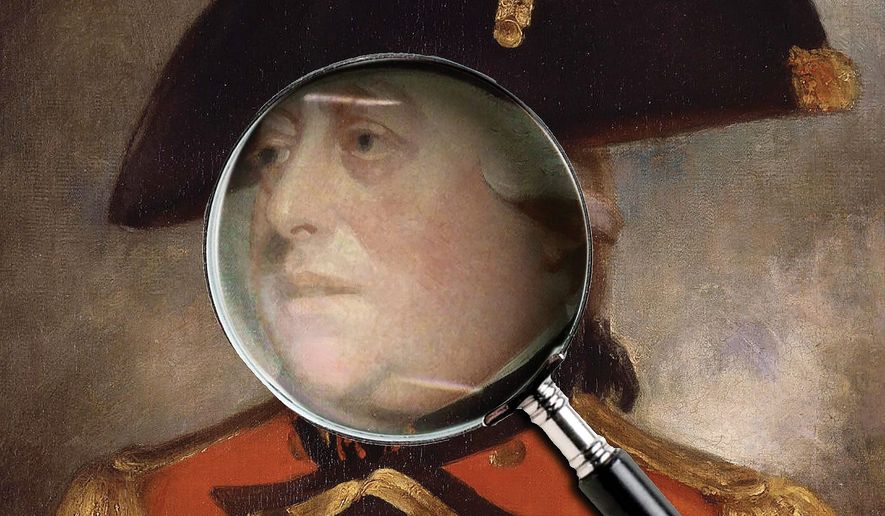OPINION:
Science is never settled. Among those who established that: Copernicus, Galileo, Newton and Einstein. History is never settled either. No one has done more to establish that than Andrew Roberts, the great British historian.
His new biography, “The Last King of America: The Misunderstood Reign of George III,” radically and persuasively revises our understanding of both the monarch and the revolution that gave rise to the United States of America.
King George III, it turns out, was neither a tyrant nor a buffoon. On the contrary, he was intelligent, humane, cultured and enlightened, an English gentleman and British patriot who ungrudgingly accepted limitations on his power. He did, however, suffer five “utterly debilitating” episodes of mental illness.
In the Declaration of Independence, 28 charges are leveled against George III. Mr. Roberts finds him not guilty of all but two: the 17th, which concerns taxation, and the 22nd, regarding the British Parliament’s legislative powers in the colonies.
Even here, there’s room for debate. The tax he imposed on his American subjects was roughly 5% — a pittance by modern standards. And the funds were to pay for the defense of the American colonies. As to the lack of American representation in the British Parliament, Mr. Roberts suggests that grievance might have been settled through negotiations.
All this and much more, Mr. Roberts derived from a wide variety of sources. His book includes 55 pages of notes and a bibliography. Thanks to Queen Elizabeth II, he had access to 100,000 previously unreleased pages from the papers of George III: a “cornucopia” of “new sources, new literature” that, he told me in an interview, inclined him to become “much more positive toward the king.”
A question: If history is always open to revision, why the outrage — not least mine — over the “1619 Project”?
That product of The New York Times (where I once hung my hat) asserts that the United States was founded not in 1776 but more than 150 years earlier when 20 slaves arrived in Virginia. According to the Times, the primary purpose of the American Revolution was to preserve slavery and the nation to which it gave birth to this day remains “systemically racist.”
My answer to the question: Unlike “The Last King of America,” the “1619 Project” is not based on serious research or new evidence. As George Will recently observed, its “historical illiteracy is not innocent ignorance. Rather it is maliciousness in the service of progressivism’s agenda, which is to construct a thoroughly different nation on the deconstructed rubble of what progressives hope will be the nation’s thoroughly discredited past.”
You should know, as editors of The New York Times apparently do not, that since time immemorial, slavery was a common practice almost everywhere on earth. In the 18th century, British and American Christians — Quakers and Evangelicals in particular — first recognized slavery as a moral abomination to be condemned, prohibited and abolished.
Gordon S. Wood, an eminent scholar of the Founding, points out that, contrary to the charges leveled in the “1619 Project,” “It’s the American Revolution that makes [slavery] a problem for the world” based on the Enlightenment precepts in the Declaration of Independence’s first two paragraphs.”
Professor Wood further notes that following the American Revolution: “Not only were the northern states the first slaveholding governments in the world to abolish slavery, but the United States became the first nation in the world to begin actively suppressing the despicable international slave trade. The New York Times has the history completely backward.”
Less than a century later, the tension between America’s founding principle, the “self-evident truth” that we are all “created equal,” and the “right” of “property in man” insisted upon by slaveholders and their defenders, led to the bloodiest conflict Americans have ever fought.
In the 20th century, Mr. Will adds, Martin Luther King Jr. “built his movement on the premise, denied by ‘The 1619 Project,’ that the Constitution is properly read as an instrument for enabling fulfillment of the Declaration’s egalitarian promise.”
Nevertheless, the “1619 Project” was awarded a Pulitzer Prize. Increasingly, its twisted historical narrative is being foisted on impressionable minds in America’s public schools. “If the Founding Fathers were evil, the founding of their country was evil and built upon a lie,” Mr. Roberts has commented. “No society can survive such an existential belief about itself.”
Which raises another question: If the American Revolution was neither a response to tyranny nor a defense of slavery, what was it?
Mr. Roberts concludes that the United States “was born not of a banal and commonplace struggle against a despot, but of a much rarer demand for self-government from a benevolent monarch. The American colonists’ story is one of a desire for independence so strong that they broke away from someone who, for contemporary propaganda purposes, they needed to portray as a tyrant. … The American Revolution is a testament not to George III’s tyranny, which was fictitious, but to Americans’ yearning for autonomy.”
In our conversation, he added: “The galaxy of talent that came together in that decade of the 1770s is truly extraordinary. You have to go back to ancient Greece, to 5th century [B.C.E.] Athens, to see such an extraordinary coagulation of brilliant people. But it still took incredible guts to take on the most powerful nation in the world.”
If, as has been said, the past is a foreign country, no one is more skilled to guide us through that distant land than Andrew Roberts. His services are especially valuable now, a time when propagandists pushing an illiberal and anti-American ideology are leading us toward a dystopian future.
• Clifford D. May is the founder and president of the Foundation for Defense of Democracies and a columnist for The Washington Times.




Please read our comment policy before commenting.